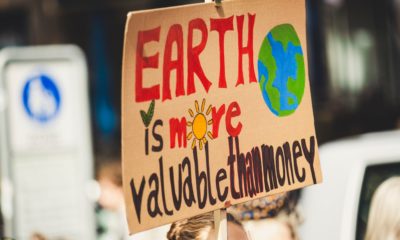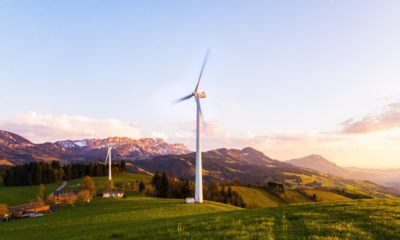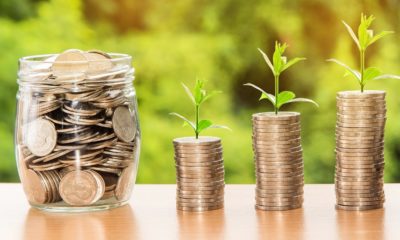Featured
How investors can actively protect the climate through passive investments
Climate change is one of the central challenges of our time. Politicians and regulators have also recognized this and are calling for joint action by companies and investors. ETF concepts that are geared towards sustainability can help investors to invest in sustainable companies, reduce climate and transition risks and thus build climate-resilient portfolios.

The market for sustainable investments is growing: According to the German Sustainable Investment Forum, the volume under management in 2019 rose to a peak value of around $318 billion (€270 billion) in Germany alone.
Worldwide, around $85 trillion were invested in 2019 and the trend is rising. One important reason for the great interest in sustainable investments is the regulatory requirements: In December 2019, the EU committed itself to climate neutrality by 2050, and the stricter draft of the Climate Protection Act provides for a CO2 reduction of 50 to 55% by 2030.
And it is not only companies that are being called upon to comply. With the adoption of the Taxonomy Regulation by the EU Parliament, the European Union is rather creating a generally valid, objective and transparent classification system, which also obliges investors.
If you want to find more details about the rising trend of ESG investment, and how companies around the world are trying to be climate resilient, download for free the Born2Invest mobile app. Our team of journalists brings you the latest finance headlines so you can stay on top of the market.
As an asset manager, Deka supports investors in managing the sustainability and especially climate risks in their portfolios
For the new ESG-Climate-Change product family, Deka has selected a two-stage approach from MSCI to implement its sustainability concept, which combines an ESG filter with climate targets. The top exclusion criterion of the index concept is serious violations of the principles of the UN Global Compact. It also excludes controversial activities, such as nuclear weapons, nuclear energy, coal and tobacco.
Furthermore, all companies with a very poor or no ESG rating are automatically disqualified. The MSCI then awards a Low Carbon Transition Score to each company. This LCT score is the core of the index concept and covers the entire value and supply chain of the company. In addition to current and future CO2 emissions, it also includes the future CO2 emission activity for companies as well as the quality of management with regard to transition risks and sustainability. Companies are then assigned to one of five categories: Solution, Neutral, Operational Transition, Product Transition and Asset Stranding. The companies in the first category – genuine solution providers who actively participate in climate protection – receive the highest weighting in the index, for example, followed by the climate-neutral companies. Compared to the original index, this results in a reduction of CO2 emissions of more than 50% – with high diversification and low tracking error.
Traditional ESG concepts often represent only 25% of the market
However, if 75% of the companies are ignored, the ambitious climate targets of the EU can hardly be achieved. That is why Deka is committed to active corporate governance, also in its ETFs. These are 100% physically replicated, i.e. Deka invests in the relevant companies in accordance with the index guidelines, so that it can also actively exercise its right to have a say at annual general meetings. That is because good corporate governance and sustainable business practices are the keys to a company’s long-term success. With its sustainable ETF strategies, Deka offers professional investors further solutions to reduce climate and transition risks and to implement the requirements of their customers without reducing the prospect of returns.
__
(Featured image by Benita5 via Pixabay)
DISCLAIMER: This article was written by a third party contributor and does not reflect the opinion of Born2Invest, its management, staff or its associates. Please review our disclaimer for more information.
This article may include forward-looking statements. These forward-looking statements generally are identified by the words “believe,” “project,” “estimate,” “become,” “plan,” “will,” and similar expressions. These forward-looking statements involve known and unknown risks as well as uncertainties, including those discussed in the following cautionary statements and elsewhere in this article and on this site. Although the Company may believe that its expectations are based on reasonable assumptions, the actual results that the Company may achieve may differ materially from any forward-looking statements, which reflect the opinions of the management of the Company only as of the date hereof. Additionally, please make sure to read these important disclosures.
First published in Borsen-Zeitung, a third-party contributor translated and adapted the article from the original. In case of discrepancy, the original will prevail.
Although we made reasonable efforts to provide accurate translations, some parts may be incorrect. Born2Invest assumes no responsibility for errors, omissions or ambiguities in the translations provided on this website. Any person or entity relying on translated content does so at their own risk. Born2Invest is not responsible for losses caused by such reliance on the accuracy or reliability of translated information. If you wish to report an error or inaccuracy in the translation, we encourage you to contact us.

-

 Africa6 days ago
Africa6 days agoMorocco’s Tax Reforms Show Tangible Results
-

 Africa2 weeks ago
Africa2 weeks agoTunisia Holds Interest Rate as Inflation Eases, Debate Grows
-

 Biotech1 day ago
Biotech1 day agoUniversal Nanoparticle Platform Enables Multi-Isotope Cancer Diagnosis and Therapy
-

 Fintech1 week ago
Fintech1 week agoRuvo Raises $4.6M to Power Crypto-Pix Remittances Between Brazil and the U.S.
























